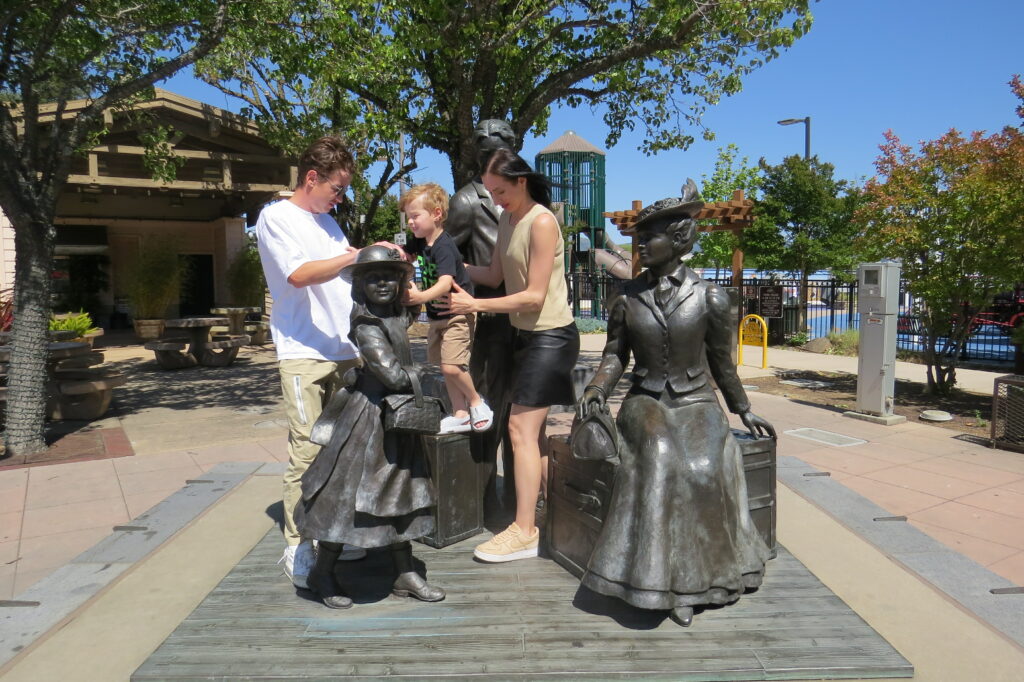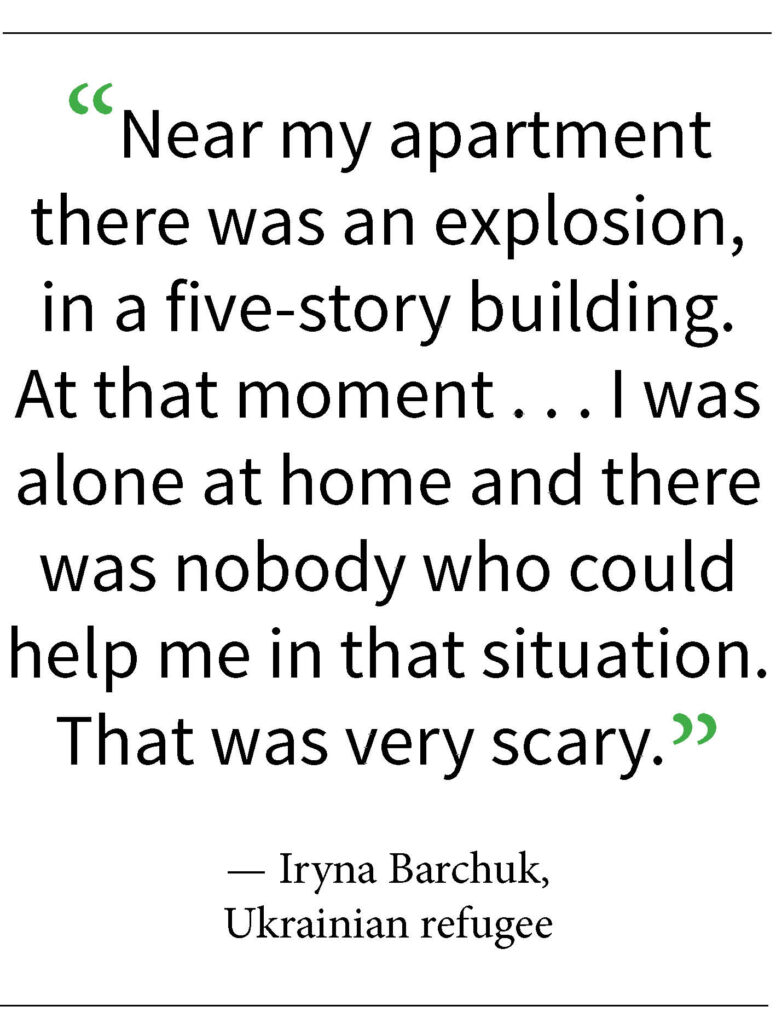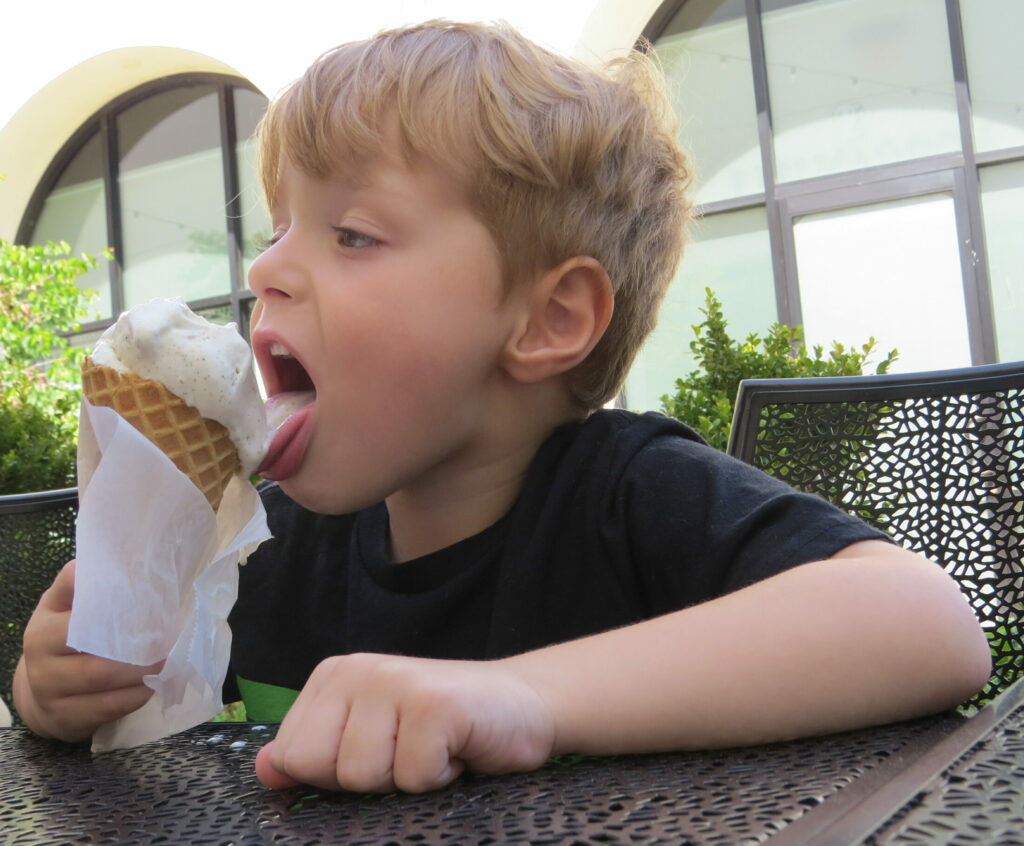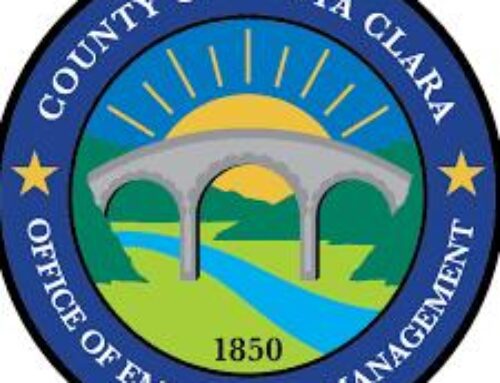Barchuks resettled with help from nonprofits, Morgan Hill Rotary
![]()

Photo by Calvin Nuttall Dmytro and Iryna Barchuk with their son, Tymur, have found a home in Morgan Hill. They enjoy an ice cream at the Morgan H ill Creamery.
By Calvin Nuttall
Since fleeing their home in Kyiv on the brink of the Russian attack on Ukraine, Iryna and Dmytro Barchuk and their then eight-month-old son, Tymur, have been displaced and drifting. With the help of a network of nonprofit agencies, they found a home in Morgan Hill.
“When war started in my country, I had a situation,” Iryna said. “Near my apartment there was an explosion, in a five-story building. At that moment, I was at home with my son. The situation made me stronger in my thoughts and I was ready to move, to do something. I was alone at home, and there was nobody who could help me in that situation. That was very scary.”

The Barchuk family play on the “Waiting for the Train” statue in downtown Morgan Hill. Photo by Calvin Nuttall
In addition to their young son, the Barchuks had an elderly grandparent and a disabled brother-in-law with cerebral palsy to worry about. Soon after the explosion near their apartment in Kyiv, Iryna arranged for her family to gather together in a village nearby where her aunt also lived.
“I moved my full family, my brother, my granny, and my parents, to this village, with the help of volunteers,” she said. “We lived there for 10 days.”
That was the first of many moves that followed. After several months of being internally displaced within Ukraine, moving from village to village and searching for the right aid organizations to help their unique family situation, the Barchuks came to the conclusion that for everyone to get the help they needed, they would have to separate.
“No one looks at you like you are the first and main person who needs this help,” Iryna said. “For example, I had such a situation when I called the Red Cross. I tried to figure out how they can help us. My granny thought that the Red Cross can help a lot in such situations, but I heard only one thing: ‘We only try to help children. It is not our priority to help disabled people.’”
Eventually, part of the family including Iryna’s husband and son as well as her brother and grandmother relocated to the Netherlands. They received assistance from the International Organization for Migration and remained for two years. While his parents worked hard to keep the family afloat there, Tymur grew up learning to speak Dutch in his daycare, not the Ukrainian his parents spoke.
“I was concentrating on helping them, my husband was working and so he took care of us,” Iryna said. “That was also a difficult choice for me, because I am a young woman, I have a plan for my future, I know what I want from this life. When you have a wish, and you love your deal, you will do everything that you can.”
 Meanwhile, Rotary Club of Morgan Hill members started looking for ways to help as the ongoing war continued to affect the lives of millions. Among them was Arlene Noodleman on the club’s World Community Service committee.
Meanwhile, Rotary Club of Morgan Hill members started looking for ways to help as the ongoing war continued to affect the lives of millions. Among them was Arlene Noodleman on the club’s World Community Service committee.
“Initially, when the war started, the immediate need was for refugees to be fed,” she said. “So we contributed a whole bunch of money to World Central Kitchen. That went on for more than a year, and then we decided, ‘It’s just money. We want to do something people-to-people.’ That’s when we contacted Jewish Family Services to say, ‘We think we are capable of being a co-sponsor of a refugee family.’”
Through a network of groups including the Hebrew Immigrant Aid Society and Jewish Family Services of Silicon Valley, the Rotary Club was able to connect with the Barchuks. From half a world away, they helped to organize for their resettlement here in Morgan Hill.
“When they first came, they had their luggage, and they got $225 from the resettlement agency,” Noodleman said. “That was everything they had. Every activity you can imagine you do, from when you wake up to when you go to sleep, needs to be thought about. First and most importantly, it was housing.”
Through a combination of diligence and luck, the club was able to secure an apartment for the family in a low-income area near downtown Morgan Hill. But housing is hardly the sole concern for a new refugee family. Everything from health insurance to transportation needs to be rebuilt from the ground up, all while learning English and finding a way to reestablish their careers in an American market.
“I want to say that we are really thankful for this organization,” Iryna said. “They are really involved in our life here, and help us organize a lot of things. They have helped us a lot. I really appreciate their support, and I hope that in the future, we can also help other people through this organization.”

Tymur enjoying an ice cream cone outside the Morgan Hill Creamery. Photo by Marty Cheek
To help the Barchuks and others like them, another subset of the Rotary organizes vocational grants to help members of the community start their careers. They chose Iryna and Dmytro, giving funds to help kick start their careers, Iryna as a cosmetologist and Dmytro as a landscaper. Iryna recently enrolled in Gavilan College’s cosmetology program.
“I am really happy with this grant,” she said. “Before my school starts, I’ll need some tools, some books, and things for work. We need, at the beginning of these classes, to pay for these tools. So, this grant was really helpful for me. Without this help, I don’t know how long I will waste my time here.”
Helping the family to achieve financial independence is one of the primary goals of any resettlement program, Noodleman said. The Barchuks plan to build their lives here in the long term. They now stay in the U.S. on one-year work visas, but they will soon apply for green cards. They believe a stable living situation is crucial for the development of their young son.
“Children are resilient, but this little child has had so much change, so many countries and languages, people and places to live,” Noodleman said. “I think now, things are finally stable. He has been in his preschool since March, which will end and then he’ll go into a summer camp in Morgan Hill. A lot of those same kids will go on to elementary school together, there will be more continuity, and he will be able to develop friendships.”
Calvin Nuttall is a Morgan Hill-based freelance reporter and columnist.







